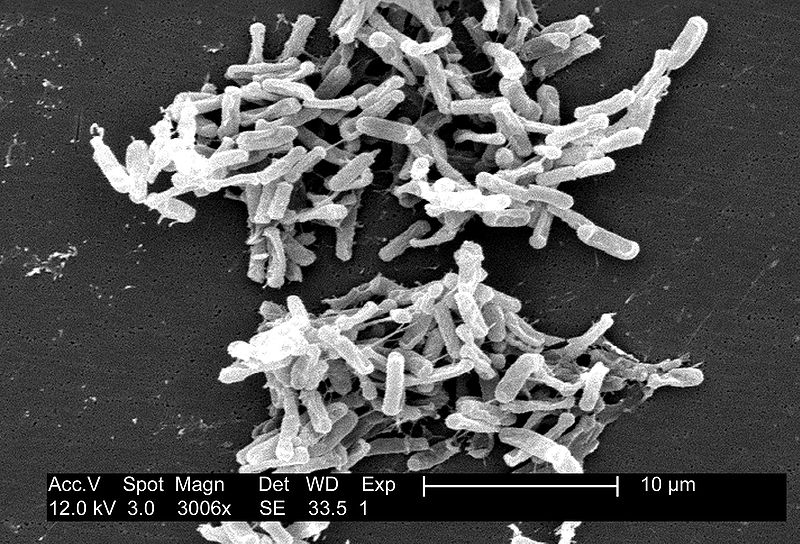April 1, 2014
High-Throughput Screen Promises to Combat C. difficile
The CBC team of Arnon Lavie and Michael Caffrey from UIC and Wayne Anderson from NU received a CBC High Throughput Screening (HTS) Supplemental Grant in June 2013. On February 21, 2014, the team’s results, entitled “Discovery of Selective Inhibitors of the Clostridium difficile Dehydroquinate Dehydratase,” were published in PLoS One. Using a HTS screening facility at UIC, the team identified three new compounds that have the potential to become novel antibiotics to fight the notoriously difficult to treat and often life-threatening gastrointestinal infections caused by the bacterium Clostridium difficile. The paper represents the first success story coming out of the CBC HTS Award program.
 Clostridium difficile (C. difficile) is a pathogenic bacterium that can cause severe, even life-threatening, gastrointestinal symptoms. The bacterium is part of the normal gut flora but is usually kept in check by other members of the commensal gut flora. Disturbances to the gut flora, often observed following the administration of broad-spectrum antibiotics (which wipe out the healthy flora but are ineffective towards C. difficile), can tip the balance towards the uninhibited growth of C. difficile, allowing for the development of the devastating disease. In recent years C. difficile infections have become increasingly common and difficult to treat. The treatment of C. difficile infections has been hindered by lack of specific antibiotics that can target the bacterium but spare the beneficial gut species.
Clostridium difficile (C. difficile) is a pathogenic bacterium that can cause severe, even life-threatening, gastrointestinal symptoms. The bacterium is part of the normal gut flora but is usually kept in check by other members of the commensal gut flora. Disturbances to the gut flora, often observed following the administration of broad-spectrum antibiotics (which wipe out the healthy flora but are ineffective towards C. difficile), can tip the balance towards the uninhibited growth of C. difficile, allowing for the development of the devastating disease. In recent years C. difficile infections have become increasingly common and difficult to treat. The treatment of C. difficile infections has been hindered by lack of specific antibiotics that can target the bacterium but spare the beneficial gut species.
CBC is pleased to report progress towards the development of C. difficile-specific drugs by a research team that received an inaugural CBC High Throughput Screening (HTS) Supplemental Grant for a proposal entitled: “Selective Inhibitors Between Pathogenic and Non-Pathogenic Bacterial Enzymes.” The awardees are Arnon Lavie and Michael Caffrey of UIC and Wayne Anderson of NU.
Established in Spring 2013, the CBC HTS Grant program has been designed to support pilot projects which are focused on biomedically-relevant targets and will be conducted at a HTS core facility located at one of the CBC universities. The three HTS facilities include: Northwestern’s High Throughput Analysis Laboratory (HTA), directed by Chi-Hao Luan, University of Chicago’s Cellular Screening Center (CSC), run by Sam Bettis and The University of Illinois at Chicago (UIC) HTS Facility, with Kiira Ratia as director. The HTS directors play a crucial role in the HTS Grant program. They consult potential applicants prior to submitting the applications for funding to the CBC, monitor the progress of funded proposals, and provide advice as needed to ensure the successful completion of the proposed work.
 Indeed, the first author on the aforementioned report is Kiira Ratia, the UIC HTS facility director (right). The publication, titled “Discovery of Selective Inhibitors of the Clostridium difficile Dehydroquinate Dehydratase,” was published in PLoS One journal on February 21, 2014. Using HTS screens conducted at the UIC HTS facility, the team identified three novel compounds which appear to specifically block a metabolic pathway (the shikimate pathway) in C. difficile. This pathway is distinctly different from the one found in harmless gut bacteria and is absent in human cells. Because of the observed specificity and the potential lack of side effects in humans, these three compounds are strong candidates for further development into novel antibiotics that could finally help combat difficult C. difficile infections.
Indeed, the first author on the aforementioned report is Kiira Ratia, the UIC HTS facility director (right). The publication, titled “Discovery of Selective Inhibitors of the Clostridium difficile Dehydroquinate Dehydratase,” was published in PLoS One journal on February 21, 2014. Using HTS screens conducted at the UIC HTS facility, the team identified three novel compounds which appear to specifically block a metabolic pathway (the shikimate pathway) in C. difficile. This pathway is distinctly different from the one found in harmless gut bacteria and is absent in human cells. Because of the observed specificity and the potential lack of side effects in humans, these three compounds are strong candidates for further development into novel antibiotics that could finally help combat difficult C. difficile infections.
CBC HTS Award (2013):
Arnon Lavie and Michael Caffrey (UIC), Wayne Anderson (NU)
Selective Inhibitors Between Pathogenic and Non-Pathogenic Bacterial Enzymes
Publication attributed to the CBC HTS Award:
Ratia K, Light S, Antanasijevic A, Anderson WF, Caffrey M, Lavie A. Discovery of selective inhibitors of the Clostridium difficile dehydroquinate dehydratase. PLoS ONE. 2014 9(2): e89356. (PubMed)
Image credit:
Scanning electron micrograph of C. difficile bacteria obtained from the CDC Public Health Image Library. CDC/ Lois S. Wiggs (PHIL #6260), 2004. Wikimedia Commons.
To learn more about the CBC HTS Supplemental Grant Program visit the HTS Award Program Description and RFA on the CBC website.
